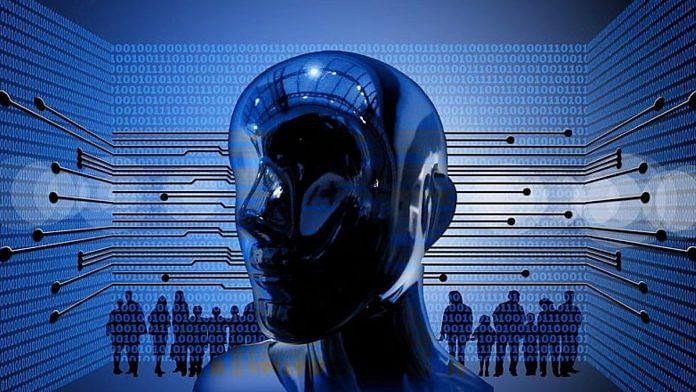The salvation promised by science and technology has its roots in Christian theology, and an important part of that theological underpinning is its apocalyptic vision of cosmic transformation. Apocalyptic thinking permeated medieval Europe, especially as Europeans engaged with Muslims in Europe, North Africa, and the Middle East. Much later, American conflict with the Soviet Union produced anxieties that appear in pop culture, science, and religion.
Religious anxieties were distinctly different from those in pop culture and science, however, because potential world-ending conflict was not just mitigated but necessitated and justified by the coming Kingdom of God. Based on traditional apocalyptic thinking drawn from ancient Jewish and Christian texts, American Christians opined that a new and better world was to come. Researchers in robotics and AI adopted that perspective, merging it with the technologies promised in science fiction to create a new religious movement: Apocalyptic AI.
Ancient apocalyptic traditions provide the ideological structures that guide 21st-century perspectives on AI: a dualistic worldview in which evil currently appears victorious but which promises that the world’s troubles will be resolved in a transcendent future redemption that abolishes evil in the transformation of the world and humanity.
Biblical texts in the Jewish tradition and the Christian tradition agree on this basic expectation for the coming world. Having previously articulated this in depth, I will only summarize it here. The ancient apocalypses (‘unveilings’ or ‘revelations’ of a divine plan) were composed from the second century bce through the first century CE.
Although related modes of discourse trace back centuries, such as to problems with the Assyrian empire in the Book of Isaiah (8th c. bce), the biblical texts that address these are prophetic oracles and hopes for redemption, not proper apocalypses. God’s claim in Isaiah (65:17) that ‘I am about to create a new heavens and a new earth’ is metaphorical, but it is fully realized in 1 Enoch (93:16) ‘And the first heaven shall depart and pass away, and a new heaven shall appear’ and in the Book of Revelation (21:1).
The true apocalyptic texts trace to Greek rule and Roman rule over Israel. It is these texts which unfold the full logic of cosmic and human transformation that is the hallmark of apocalyptic salvation. These apocalyptic texts describe a dualistic worldview in which believers suffer from alienation. Good and evil are at war in the world, and the faithful suffer because evil reigns.
‘Apocalyptic discourse is dualistic temporally, spatially, and socially. It divides this world from the world to come, earth from heaven, and us from them—dwellers in heaven from dwellers on earth, children of light from children of darkness’.
This dualistic perspective aligns everything in the cosmos: heaven and earth, saints and sinners, angels and devils, souls and bodies (it is important to note, however, that for most apocalyptic believers, it is not bodies in general but the specific bodies inhabited by sinful humanity which are problematic; this matters for their expectations of redemption). Having structured the world under the opposition of good and evil, it is not hard for apocalyptic communities to see evil as governing the world.
Such interpretations are predictable thanks to human psychology: we have a cognitive bias towards the negative. Not everyone with a dualistic view of the cosmos is apocalyptic: in theory, the forces of good could be winning. So the alienation experienced by those who see the world as a domain of evil is a crucial aspect of apocalyptic thinking—it is this that will demand cosmic restitution. ‘Apocalyptic is a language of crisis’, but the form of such crises can vary considerably. Sometimes, political and economic disenfranchisement produces apocalyptic thinking, such as we see in 1 Enoch (103:11): ‘We hoped to be the head and have become the tail: We have toiled laboriously and had no satisfaction in our toil; and we have become the food of the sinners and the unrighteous, and they have laid their yoke heavily upon us’.
But even those in political power can find themselves staring at a grim and dark world. In the ancient context of Greek and Roman rule, even well-off Jews faced a constant existential crisis in terms of their covenant with God and the moral and political questions raised by foreign rule. Similarly, religious evil can produce alienation as groups debate appropriate behaviours or beliefs. Death is the most visible sign of evil’s reign; in the face of it, apocalyptic thinkers anticipate an immortal future. Despite their experience of alienation, apocalyptic believers are fundamentally optimistic.
This optimism reflects typical psychological responses to negativity: we respond ‘to negative events with short-term mobilization and long-term minimization’. That is, we react strongly and quickly to negative news, but we reduce our level of concern over time. In apocalyptic perspectives, this means that the immediacy of crisis recedes as believers anticipate their future redemption.
For this reason, Hollywood films labeled ‘apocalyptic’ are more correctly ‘eschatological’. They deal with the end of times, but not the inauguration of new times that apocalyptic believers expect will solve their alienation. In Jewish and Christian apocalyptic thinking, the end of this world is but the precursor to the beginning of a new and better world. This new world is more than simply a better world, it is one that resolves the fundamental dualism (and hence, alienation) of the old.
 This excerpt from ‘Futures of Artificial Intelligence: Perspectives from India and the U.S.’ has been published with permission from Oxford University Press.
This excerpt from ‘Futures of Artificial Intelligence: Perspectives from India and the U.S.’ has been published with permission from Oxford University Press.



